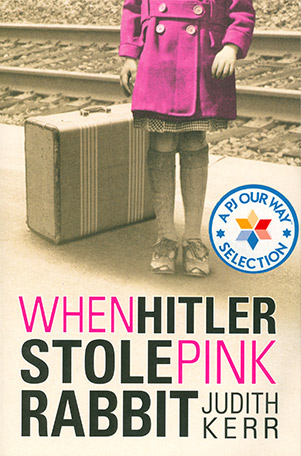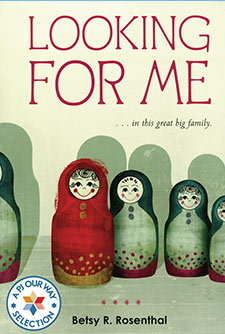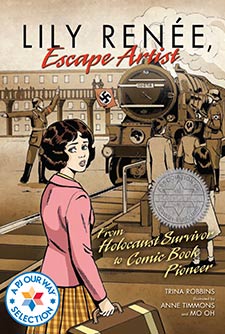When Hitler Stole Pink Rabbit
Nine-year-old Anna doesn't understand why her family needs to keep moving. But Germany is no longer safe for Jews and escape may be the only way her family can stay together!
Average Rating
( hint: Login to leave a review! )
36 Reviews
Leave Review
What the Book is About
Jewish Content & Values
Positive Role Models
Content Advisory
Talk it Over!
More for You
What the Book is About
Nine year-old Anna lives in Germany in 1933 with her mama, papa, and older brother, Max. Daughter of a celebrated Jewish author, she and her family are forced to flee Hitler's ascendency to power. They escape to Switzerland, and then immigrate to France as Anna’s father finds it increasingly difficult to find work. Anna’s family learns to economize, and humorous, lighthearted, and sometimes poignant anecdotes describe the family's attempt to live normally as the refugee go to school in different countries, learn new languages, make new friends, and keep their positive outlook. This partly autobiographical book is based on Judith Kerr’s own experiences, fleeing the Nazis in the 1930’s.
Jewish Content & Values
- The concept of anti-Semitism and the rise of the Nazis in Europe are addressed in an age appropriate way. When Anna’s best friend, Elsbeth, learns that Hannah is Jewish, she asks why her nose isn’t bent (exploring anti-Semitic stereotypes of the time). Also, Anna and Max play with some German children until those children’s Nazi parents forbid them to play together.
- Kiddush Ha-shem (sanctifying God’s name) is an important precept in Judaism; it refers to an action by a Jewish person that brings honor and respect to God. Although Anna’s family is completely secular (they celebrate German Christmas), the children are encouraged to be proud representatives of the Jewish people and behave accordingly.
Positive Role Models
- Anna and Max rise to the challenge of being refugees in different but admirable ways. Anna cares deeply about her family and is always up for an adventure. Max is initially an indifferent student, but manages to buckle down and win the prix de excellence (the best student in the class prize) in Paris, an enormous achievement for a new immigrant.
- Mama and Papa are an impractical pair of intellectuals who struggle to adjust to their new reality as refugees. Their optimistic spirit is evident as Mama learns to cook and clean; and Papa, when discussing their situation, says thoughtfully, “It’s an odd feeling…You live in a country all your life... Then suddenly, it’s taken over by thugs and there you are, on your own in a strange place, with nothing.” … "Don’t you mind?" asks Anna...“I find it very interesting."
- Onkle Julius is a kind and gentle soul, who refuses to believe the writing on the wall for Germany’s Jews. His faith in man’s existential goodness is an inspiration.
Content Advisory
The following could be emotionally difficult:
- The book takes place against the background of Adolf Hitler’s ominous rise to power. Even though it is gently written, the subject matter is heavy and may elicit questions from your child about this period of history.
- Anna overhears her mama and grandmother discussing a famous Jewish professor who was taken to a concentration camp where he was chained and treated like a dog for two months until he went mad. Anna is visibly shaken by the story and they quickly change the subject.
- Anna’s family learns that Onkle Julius has committed suicide (by taking pills) months after he is fired from his post as curator of Berlin’s Museum of Natural History and banned from visiting his beloved Berlin Zoo because of his Jewish ancestry.
Talk it Over!
- Anna and Max have been playing with their friends, Vreneli and Franz, at the Zwirn cottage for weeks when some German children named Siegfried and Gudrun arrive and join them. After watching them play together, Siegfried' and Gudrun’s mother, who supports the Nazis, forbids her children from playing with Anna and Max because they are Jewish. Vreneli and Franz then say they can’t play with Max and Anna either!
- Do you think that it’s fair that the children are not allowed to play together because of their parents’ views? What would you do if you were Vreneli and Franz? What would you do if you were Siegfried and Gudrun?
More for You
Jewish Life in France: Anna and her family celebrate the anniversary of the French Revolution, a day of great significance for the Jews in France. Jews had been living in France since the early Middle Ages. Rashi is one of the most famous French Medieval Talmudic scholars. With the storming of the Bastille at the end of the 18th century, came the “Declaration of Human Rights,” a critical document that served as the basis for French Jews to be the first Jews in Europe to gain emancipation. Today, over half a million Jews live in France. Unfortunately, anti-Semitism is still very much an issue in France and over 5,000 French Jews have made Aliyah to Israel since 2011, with that number expected to double in the next few years.
What the Book is About
What the Book is About
Nine year-old Anna lives in Germany in 1933 with her mama, papa, and older brother, Max. Daughter of a celebrated Jewish author, she and her family are forced to flee Hitler's ascendency to power. They escape to Switzerland, and then immigrate to France as Anna’s father finds it increasingly difficult to find work. Anna’s family learns to economize, and humorous, lighthearted, and sometimes poignant anecdotes describe the family's attempt to live normally as the refugee go to school in different countries, learn new languages, make new friends, and keep their positive outlook. This partly autobiographical book is based on Judith Kerr’s own experiences, fleeing the Nazis in the 1930’s.
Jewish Content & Values
Jewish Content & Values
- The concept of anti-Semitism and the rise of the Nazis in Europe are addressed in an age appropriate way. When Anna’s best friend, Elsbeth, learns that Hannah is Jewish, she asks why her nose isn’t bent (exploring anti-Semitic stereotypes of the time). Also, Anna and Max play with some German children until those children’s Nazi parents forbid them to play together.
- Kiddush Ha-shem (sanctifying God’s name) is an important precept in Judaism; it refers to an action by a Jewish person that brings honor and respect to God. Although Anna’s family is completely secular (they celebrate German Christmas), the children are encouraged to be proud representatives of the Jewish people and behave accordingly.
Positive Role Models
Positive Role Models
- Anna and Max rise to the challenge of being refugees in different but admirable ways. Anna cares deeply about her family and is always up for an adventure. Max is initially an indifferent student, but manages to buckle down and win the prix de excellence (the best student in the class prize) in Paris, an enormous achievement for a new immigrant.
- Mama and Papa are an impractical pair of intellectuals who struggle to adjust to their new reality as refugees. Their optimistic spirit is evident as Mama learns to cook and clean; and Papa, when discussing their situation, says thoughtfully, “It’s an odd feeling…You live in a country all your life... Then suddenly, it’s taken over by thugs and there you are, on your own in a strange place, with nothing.” … "Don’t you mind?" asks Anna...“I find it very interesting."
- Onkle Julius is a kind and gentle soul, who refuses to believe the writing on the wall for Germany’s Jews. His faith in man’s existential goodness is an inspiration.
Content Advisory
Content Advisory
The following could be emotionally difficult:
- The book takes place against the background of Adolf Hitler’s ominous rise to power. Even though it is gently written, the subject matter is heavy and may elicit questions from your child about this period of history.
- Anna overhears her mama and grandmother discussing a famous Jewish professor who was taken to a concentration camp where he was chained and treated like a dog for two months until he went mad. Anna is visibly shaken by the story and they quickly change the subject.
- Anna’s family learns that Onkle Julius has committed suicide (by taking pills) months after he is fired from his post as curator of Berlin’s Museum of Natural History and banned from visiting his beloved Berlin Zoo because of his Jewish ancestry.
Talk it Over!
Talk it Over!
- Anna and Max have been playing with their friends, Vreneli and Franz, at the Zwirn cottage for weeks when some German children named Siegfried and Gudrun arrive and join them. After watching them play together, Siegfried' and Gudrun’s mother, who supports the Nazis, forbids her children from playing with Anna and Max because they are Jewish. Vreneli and Franz then say they can’t play with Max and Anna either!
- Do you think that it’s fair that the children are not allowed to play together because of their parents’ views? What would you do if you were Vreneli and Franz? What would you do if you were Siegfried and Gudrun?
More for You
More for You
Jewish Life in France: Anna and her family celebrate the anniversary of the French Revolution, a day of great significance for the Jews in France. Jews had been living in France since the early Middle Ages. Rashi is one of the most famous French Medieval Talmudic scholars. With the storming of the Bastille at the end of the 18th century, came the “Declaration of Human Rights,” a critical document that served as the basis for French Jews to be the first Jews in Europe to gain emancipation. Today, over half a million Jews live in France. Unfortunately, anti-Semitism is still very much an issue in France and over 5,000 French Jews have made Aliyah to Israel since 2011, with that number expected to double in the next few years.



